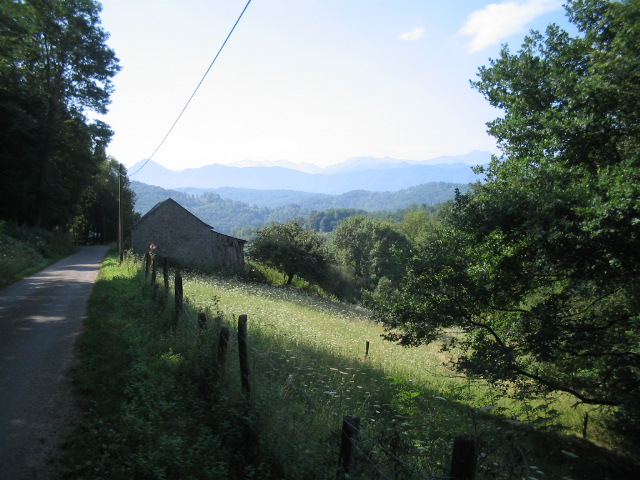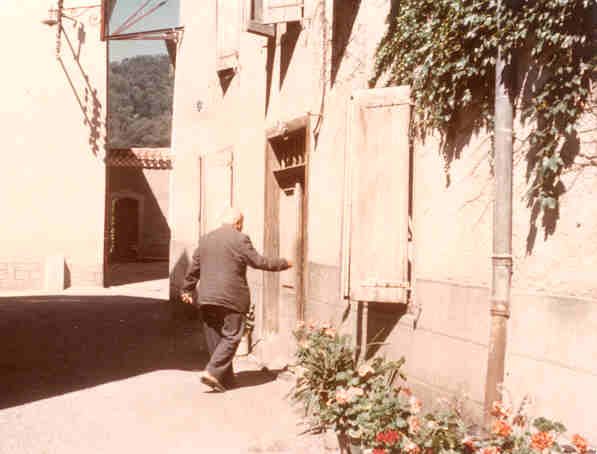|
I started out my linguistics career with an interest in the geographic spread of sound change, and I wrote my Master's thesis on grammatical constraints in the raising of *a to [o] in Southern France, based on data from the Atlas Linguistique de la France. I then went off to the Pyrenees to see and hear for myself. Between 1970-1972, I lived in St. Pierre de Soulan, a village of about 80 people in the foothills of the Pyrenees - a place whose beauty still leaves me breathless, and whose inhabitants are still central to my life. |

|
|
|
The inhabitants of Soulan when I was there in 1970-72 represented almost the entire progress of the village's shift from Gascon to French - the oldest inhabitants were the first generation to all go to school and learn French as a second language, while the youngest inhabitants were almost all monolingual French speakers. The process of shift both resulted from, and strengthened, the stigmatization of the dialect. I documented this in my paper "Diglossia: Separate and Unequal" While I did not focus my research on code-switching, I noted that the differing second person pronouns of the two languages interacted. Since French has a predominantly "solidarity" system and Gascon has a predominantly "power" system, code-switching allows for strategies in pronominal address. |
|
Soulan lies in right smack in the middle of the Gascon- Languedocien isogloss bundle, and in a very small area affected by some Couserannais sound changes, which makes the dialect about as stigmatized as it can be. Even Pierre Bec, renowned author of the ultimate source on the Gascon-Languedocien boundary (Les Interferences entre le Gascon et le Languedocien) cringed at the sound of my "nonstandard" past participles. This particular stigmatization of transitional dialects - dialects that lie far from the cultural centers that claim ownership of "Gascon" and "Languedocien" - particularly attracted my interest. On the one hand, it is similar to the national stigmatization of regional dialects altogether in the face of French. On the other, it arises from the need felt by regionalist movements to have a standard regional language as symbol of authenticity. The fact that the movement has opted for one standard language rather than for celebrating the enormous diversity of local dialects has not, as far as I can see, saved the language from extinction, and it adds a level of stigma to dialects like Soulatan (see "The Paradox of Regional Language Movements." My main work on Soulatan Gascon focused on sound change - particularly on variable processes in the phonological history of the dialect, as traceable both through current patterns of variation and through geographic distributions.My dissertation, treated a variety of phonological processes - intervocalic consonant lenition, metathesis, and a back vowel shift. I didn't publish nearly as much of that work as I should have, for complicated reasons among which was my eagerness to start examining the social meaning of changes in progress, which led me right into fieldwork with American adolescents. |
|
|
|
In the fall of 2005, I began doing fieldwork on Gascon again. I had planned to save this for my retirement, but I'm not ready for retirement, and it will soon be too late. I'm doing what I wished I'd done thirty years ago - examining the patterns of variation across the isogloss bundle. I can't get a complete sample because some villages no longer have Gascon speakers. Ironically, many of the villages are more populated now than they were in the seventies, but by people from Paris, Toulouse, and England. And the speakers that are left no longer have the kind of cultural knowledge their parents had, so I can only learn about things like rivalries between villages - which could be important linguistically - second hand. On the other hand, the current generations of speakers are very proud of their language, helpful and happy to be recorded, and have a very sharp understanding of language politics. The Soulatans whose photographs are shown above are all precious to me, and all now long dead - from the top, Augusta Andreu, Louis Reich, and Andre "Pépi" Vidal. To the left are some current speakers: Louis Dougnac, from Soueix, who is the age of the children of most of the people I worked with in the seventies, and Gerard Piquemal, from the Taus, who is the age of their grandchildren. They, and others, have agreed not only to participate in my research, but to have their recordings (and photographs) entered into a public archive. Meanwhile, for a quick sample, you can hear Monsieur Dougnac, who's a well-known local storyteller, telling a piece of an apocryphal story about his neighbors from Rogalle, a village higher up in the mountains (who make the most amazing cheese). |
|
And to the right is Hélène Sentenac, from Cominac, who has spent hours and hours with me working out the fine grammatical details that I didn't get to in my earlier work. At the time I was doing my dissertation, Hélène was the school teacher in Castet d'Aleu, in the valley below Massat, married to Maurice Sentenac, the baker of Castet. Back in the seventies, there was no way I could have worked with Helene, she was so busy not only teaching, but making croustades and often doing the bakery rounds in the villages. I don't think I've ever met anyone who worked so hard. And it was Hélène and her family who first took me to Soulan and introduced me to Pépi Vidal and the Rumeau Family, who gave me a place to live and a family life to go with it. And now the younger generation of Rumeaus, three of my favorite people in the world (at right from left to right Bernard, who was 11 when I arrived in Soulan, Patricia who was 2, and Gisèle who was 14) are part of the current generation of Soulatans.
|
| |
My Publications on Gascon
|
Eckert, Penelope (1985) Grammatical Constraints in Phonological Change: Unstressed *a in Southern France Orbis 31, 169-89. Eckert, Penelope. (1983). The Paradox of Regional Language Movements. Journal of Multilingual and Multicultural Development. 4, 289-300. Eckert, Penelope (1982) Notes on Pronominal Strategies in a Bilingual Community. In David Sankoff and Henrietta Cedergren Eds., Variation Omnibus. Edmonton:Linguistic Research Inc. 499-504. Eckert, Penelope (1980). Diglossia: Separate and Unequal. Linguistics. 18.1053-64. Eckert, Penelope (1980). The Structure of a Long-Term Phonological Process: The Back Vowel Chain Shift in Soulatan Gascon. In William Labov, Ed., Locating Language in Time and Space. New York:Academic Press, 179-219. Eckert, Penelope (1978). Past and present of long-term phonological processes in Soulatan Gascon. PhD Thesis: Columbia University. |



